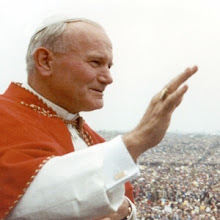My contention is that the unending and reciprocal love of the Trinity is the dominant principle of all being and reality that must be explored and entered into in order to avoid reducing our experience merely to the political expression of power and authority. Power and authority must be at the service of love or they remain insufficient means of change in our world because they never revolutionize our world to the very core of being but only constitute a change in the external structures that govern the application of power and authority. To quote a friend and professor, "...it doesn't go to the heart of the issue but only changes the color of the hats."
In his first encyclical, Redemptor Hominis, John Paul II stated:
Man cannot live without love. He remains a being that is incomprehensible for himself, his life is senseless, if love is not revealed to him, if he does not encounter love, if he does not experience it and make it his own, if he does not participate intimately in it. This, as has already been said, is why Christ the Redeemer "fully reveals man to himself". If we may use the expression, this is the human dimension of the mystery of the Redemption. In this dimension man finds again the greatness, dignity and value that belong to his humanity. In the mystery of the Redemption man becomes newly "expressed" and, in a way, is newly created. He is newly created!As this encyclical set the tone for his entire pontificate John Paul II began by pointing out the link between Wisdom and Love. This would set the stage to a more complete exposition of the inseparable link between faith and reason. When reason is correctly formed it does, in fact, lead man to the truth. There is, however, a limit to how deep one can penetrate the depths of truth and reality on the terms of reason alone. Reason, nonetheless, sets the stage for an understanding and an acceptance of Revelation. This must be the link between philosophy and theology. This is where man can proceed from simply asking the preeminent questions of life, such as "why do I exist?", "where do I come from?", "why, if God is good, can there be evil?". Ultimately these are the questions that a healthy society asks. These kinds of questions lead us back to the source and heart of all existence - i.e. Love. They cannot be answered simply because they always presume the interplay of a communion of persons and the subjective experience of this encounter with the other.
Upon his first arrival to the United States John Paul II commented on the great number of developments in the fields of technology, medicine, science, but he also asked a very sincere and pertinent question. He proceeded, "but where are your poets and artists?". It is the poets and artists who delve into these preeminent questions of life that must be asked by all thriving societies and cultures.
"God is love"58. Above all, love is greater than sin, than weakness, than the "futility of creation"59, it is stronger than death; it is a love always ready to raise up and forgive, always ready to go to meet the prodigal son60, always looking for "the revealing of the sons of God"61, who are called to the glory that is to be revealed"62. This revelation of love is also described as mercy63; and in man's history this revelation of love and mercy has taken a form and a name: that of Jesus Christ. (RH)While much remains to be said this, I believe, is a good starting point for such a blog. Again, my hope is for the building of an "adequate anthropology" in the light of the work of John Paul II, Joseph Ratzinger, Hans Urs von Balthasar, Henri de Lubac, Jean Cardinal Daniélou, and others who have recognized that the beginning of our search for man and his place in the cosmos must begin with the reality that we have all first received our being from another and that this utterly gratuitous gift elicits a response in love that calls us out of ourselves into communion with God and the world around us.

2 comments:
Which of the books below would be the best starting point for someone who is interested in your blog?
The two I would suggest starting with (they're both short) would be "The Gift: Creation" by Kenneth Schmitz and "Deus Caritas Est" which you can download from the Vatican website if you like (only about 10 pages). See www.vatican.va
Enjoy,
Eric
Post a Comment